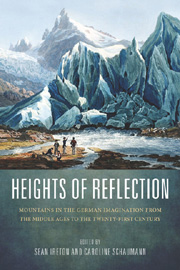 Heights of Reflection
Heights of Reflection from Part III - Modern Expeditions and Evocations: Climbing from the Twentieth into the Twenty-First Century
Published online by Cambridge University Press: 05 February 2013
Nineteen twenty-four, the year Thomas Mann's Der Zauberberg (The magic mountain) was published, is an important date in the history of the representation of mountains. In the German tradition, this novel is the most prominent work of literature whose entire plot and structure draw on mountains. It offers an investigation into the repertoire of established tropes of mountain discourses from Petrarchan humanism and the Romantic sublime to the thrill of sport and mountain climbing in modern times. Absorbing literary traditions as well as contemporary travel literature and commonplaces of an emerging bourgeois mountaineering culture, Mann's novel has also shaped the future of mountain literature to the degree that it established itself as a canonical work of German literature. Its publication therefore constitutes a turning point in the way in which the Alpine realm is experienced and represented. After 1924, the mountains would never be the same again.
Few facets of the novel — from the details of contemporary Davos to the allegoric and sociopolitical — have eluded scholarly attention, and since the 1990s the medical dimension of the novel has become a major field of inquiry. But only a handful of interpreters have granted this dimension the importance it deserves. Far from being a subsidiary aspect, it constitutes a major thematic and formal innovation in the text. Although Hans Castorp, the novel's protagonist, experiences the mountains as a place of beauty (or alternatively of the sublime), of humanist reflection, and of sport, these experiences — and with them the reader's expectations — are undermined by irony.
To save this book to your Kindle, first ensure [email protected] is added to your Approved Personal Document E-mail List under your Personal Document Settings on the Manage Your Content and Devices page of your Amazon account. Then enter the ‘name’ part of your Kindle email address below. Find out more about saving to your Kindle.
Note you can select to save to either the @free.kindle.com or @kindle.com variations. ‘@free.kindle.com’ emails are free but can only be saved to your device when it is connected to wi-fi. ‘@kindle.com’ emails can be delivered even when you are not connected to wi-fi, but note that service fees apply.
Find out more about the Kindle Personal Document Service.
To save content items to your account, please confirm that you agree to abide by our usage policies. If this is the first time you use this feature, you will be asked to authorise Cambridge Core to connect with your account. Find out more about saving content to Dropbox.
To save content items to your account, please confirm that you agree to abide by our usage policies. If this is the first time you use this feature, you will be asked to authorise Cambridge Core to connect with your account. Find out more about saving content to Google Drive.